
Bulletin of the Peabody Museum of Natural History
Scope & Guideline
Contributing to the Science of Our Natural World
Introduction
Aims and Scopes
- Taxonomy and Systematics:
The journal publishes studies that involve the classification and systematic relationships of organisms, including both extant and extinct species. This includes phylogenetic analyses and revisions of species based on morphological and genetic data. - Paleontology and Fossil Records:
Research focusing on the fossil record, including descriptions of new species, revisions of existing taxa, and discussions of historical and geological contexts of fossils. The journal highlights significant paleontological findings that provide insights into the evolutionary history of life. - Biodiversity and Conservation:
The journal includes studies assessing biodiversity, particularly in relation to specific geographic regions or ecosystems. This encompasses inventory and assessment of collections, which contribute to the understanding of species distribution and conservation needs. - Ecological and Evolutionary Studies:
Research that explores the ecological interactions and evolutionary contexts of organisms, including studies on social behaviors, ecological adaptations, and the implications of these factors in both contemporary and ancient ecosystems. - Museum Collections and Historical Significance:
The journal publishes articles that highlight the importance of museum collections, their historical significance, and their role in advancing scientific knowledge, particularly through the examination and curation of specimens.
Trending and Emerging
- Integrative Taxonomy:
There is a growing trend towards integrative approaches in taxonomy, combining morphological, genetic, and ecological data to provide comprehensive classifications and understand evolutionary relationships. - Ecological Contexts in Paleontology:
Recent publications emphasize the ecological contexts of fossils, exploring how ancient organisms interacted with their environments. This trend highlights the importance of understanding ecosystems in both ancient and modern contexts. - Technological Advances in Research:
The utilization of advanced technologies, such as genomic sequencing and computational phylogenetics, is becoming more common in studies published in the journal. This reflects a broader trend in the life sciences towards incorporating new technologies to enhance research findings. - Conservation and Biodiversity Assessments:
There is an increasing focus on research related to biodiversity assessments and conservation strategies, particularly in light of global environmental changes. This reflects a heightened awareness of the need for conservation and the role of museums in preserving biodiversity.
Declining or Waning
- Marine Biodiversity Studies:
There has been a noticeable reduction in studies specifically focused on marine organisms and ecosystems, particularly in relation to crustaceans and other marine invertebrates. This may reflect a broader trend in the field where terrestrial studies are gaining more attention. - Historical Taxonomic Revisions:
While taxonomic revisions remain important, there seems to be a decline in the frequency of comprehensive reviews of historical taxonomic classifications, particularly for well-studied groups. This could indicate a shift towards more novel discoveries rather than re-evaluations of existing classifications. - Morphological Studies of Extinct Species:
Research focused solely on the morphological aspects of extinct species, such as detailed anatomical studies without a phylogenetic context, appears to be waning. This may be due to the increasing integration of genetic data into paleontological research.
Similar Journals
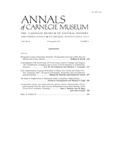
ANNALS OF CARNEGIE MUSEUM
Exploring Earth's Secrets: A Scholarly Journey Through Natural HistoryANNALS OF CARNEGIE MUSEUM, published by the Carnegie Museum of Natural History in the United States, stands as a significant forum for scholarly research in the fields of Ecology, Evolution, Behavior, Systematics, and Geology. With an established history from 1990 to 2024, this journal caters to the scientific community by fostering the dissemination of high-quality, peer-reviewed articles that enhance our understanding of Earth's biological and geological processes. Notably recognized in the 2023 category quartiles, the journal ranks in Q2 for both Ecology and Geology, showcasing its importance and relevance in these disciplines. Although it currently does not offer open access options, the journal's rigorous editorial standards and impactful research, evidenced by its Scopus rankings, make it an indispensable resource for researchers, professionals, and students aiming to contribute to the advancing knowledge of natural history. The ISSN 0097-4463 and E-ISSN 1943-6300 facilitate easy access to its comprehensive archives, ensuring that vital insights into the natural world are readily available for ongoing scholarly exploration.

PalZ
Showcasing Transformative Insights in PaleontologyPalZ is a prestigious academic journal in the field of Paleontology, published by Springer Heidelberg in Germany. With a long-standing history that traces back to its converged years from 1914 to 2024, this journal offers invaluable insights into the evolutionary dynamics and ecological relationships of past life forms. Holding a commendable impact factor and ranked in the Q2 category of Paleontology, it consistently showcases high-quality research that resonates within the scientific community, evidenced by its Scopus rank of #38 out of 113 in Earth and Planetary Sciences. PalZ is committed to open access, ensuring that its rich repository of scholarly articles is readily accessible for researchers, professionals, and students alike. By engaging with the journal, readers will encounter cutting-edge studies that are pivotal for advancing our understanding of paleobiology and the historical patterns of biodiversity.
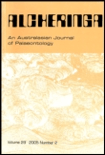
ALCHERINGA
Unraveling the Mysteries of Life Through ResearchALCHERINGA, published by Taylor & Francis Ltd, is a distinguished academic journal that has been at the forefront of research in the fields of ecology, evolution, behavior, systematics, and paleontology since its inception in 1975. With an ISSN of 0311-5518 and E-ISSN 1752-0754, this journal serves as a critical platform for the dissemination of high-quality research, contributing significantly to the understanding of biological and geological sciences. Ranking in the Q3 quartile for both Ecology, Evolution, Behavior and Systematics, as well as Paleontology, ALCHERINGA is well-positioned within the academic community, attracting submissions from researchers across the globe. The journal's Scopus ranks further highlight its relevance, particularly its position in the 51st percentile for Ecology and the 50th percentile for Paleontology. Although it does not operate under an open access model, ALCHERINGA remains committed to providing valuable insights and fostering discussions that are essential for the advancement of these vital scientific disciplines. Researchers, professionals, and students are encouraged to explore the profound implications of the studies published within, making it an indispensable resource for anyone aiming to deepen their expertise in these fields.

PROCEEDINGS OF THE LINNEAN SOCIETY OF NEW SOUTH WALES
Exploring Australia's Rich Biodiversity and Ecological InsightsPROCEEDINGS OF THE LINNEAN SOCIETY OF NEW SOUTH WALES, ISSN 0370-047X, is a prestigious journal published by the Linnean Society of New South Wales, dedicated to the advancement of knowledge in the fields of natural history, ecology, and biodiversity. Established in the mid-20th century, this journal serves as a vital platform for reporting original research, reviews, and discussions on various aspects of Australian flora and fauna, along with broader contributions to environmental science. Though the journal is not open access, it remains an important resource for researchers, students, and professionals seeking to engage with high-quality studies that inform conservation efforts and ecological understanding in the region. The journal's historical significance is underscored by its coverage of pivotal research from 1980 to 2015, fostering ongoing dialogue within the scientific community and promoting the values of the Linnean Society's commitment to natural history scholarship.

Bulletin de la Societe Linneenne de Lyon
Building Bridges in the Academic CommunityBulletin de la Societe Linneenne de Lyon is a distinguished journal in the field of natural sciences, published by Société Linneenne de Lyon, a renowned institution in the heart of France. This journal, bearing the ISSN 2554-5280, serves as a crucial platform for the dissemination of high-quality research articles, reviews, and discussions that focus on the diversity of life and its conservation, reflecting the foundational principles established by Carl Linnaeus. Although it operates under a traditional access model, the bulletin significantly contributes to the advancement of botany, zoology, and ecology by providing a forum for original research that often garners attention from scholars and practitioners alike. With a commitment to fostering collaboration and dialogue among researchers, this journal is positioned as a vital resource for anyone dedicated to understanding the complexities of biological sciences and systems. The impact of its publications is amplified by its ties to a prominent academic community, making it an essential read for professionals, researchers, and students eager to stay informed on the latest developments in their fields.
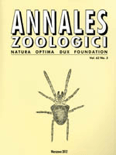
ANNALES ZOOLOGICI
Delving into the Dynamics of Animal BiologyANNALES ZOOLOGICI is a distinguished academic journal published by the Museum & Institute of Zoology, Polish Academy of Sciences, based in Warsaw, Poland. With a long-standing tradition in zoological research, this journal has evolved to encompass a diverse range of studies in ecology, evolution, behavior, and systematics, aiming to foster a deeper understanding of animal biology and conservation. It holds a commendable Q2 classification in the 2023 Ecology, Evolution, Behavior and Systematics category, indicating its significant contribution to the field. Although ANNALES ZOOLOGICI is not an open-access publication, it remains accessible to a global audience of researchers, professionals, and students aiming to advance their knowledge and engage with cutting-edge zoological findings. As of 2024, this journal continues to be a vital resource for those eager to explore the complexities of animal life and contribute to ongoing discussions within this essential scientific discipline.

European Journal of Taxonomy
Illuminating the path to a deeper understanding of nature.The European Journal of Taxonomy is a distinguished open access journal, published by the MUSEUM NATL HISTOIRE NATURELLE in France, dedicated to the rich and dynamic field of taxonomy, ecology, and systematics. Since its inception in 2011, this journal has aimed to provide a platform for the dissemination of high-quality research and innovative methods relevant to the study of biodiversity and species classification. With a commendable Q2 ranking in the Ecology, Evolution, Behavior and Systematics category as of 2023, the journal ranks 380 out of 721 in Scopus, highlighting its pivotal role in advancing scientific knowledge in these essential areas. Researchers and students alike will find valuable resources and contributions that address pressing ecological and evolutionary questions from 2015 to 2024. By promoting open access, the European Journal of Taxonomy ensures that vital research is accessible to a broader audience, fostering collaboration and discourse among professionals striving to enhance our understanding of the natural world.
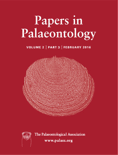
Papers in Palaeontology
Exploring the Depths of Ancient LifePapers in Palaeontology, published by WILEY, is a premier academic journal dedicated to advancing the field of paleontology. With an admirable impact factor and positioned within the Q1 category in Paleontology for 2023, this journal has established itself as a leading platform for innovative research and discussion, ranking 17th out of 113 in Scopus’s Earth and Planetary Sciences category. Since its inception in 2015, Papers in Palaeontology has aimed to publish high-quality, peer-reviewed articles that explore the diversity of ancient life forms and their evolutionary history. Researchers, professionals, and students alike will find valuable insights and rigorous analyses that contribute to the understanding of our planet’s past. Although Open Access options are not available, the journal provides a wealth of knowledge essential for anyone engaged in the study or practice of paleontology, solidifying its importance in shaping future academic discourse.

Journal of Insect Biodiversity
Diving Deep into Insect Diversity and BehaviorJournal of Insect Biodiversity, published by MAGNOLIA PRESS in New Zealand, offers a vital platform for researchers and professionals interested in the intricate world of insect science. Established in 2019, this journal covers a wide array of topics within its field, focusing on the ecological, evolutionary, and behavioral aspects of insects, while also engaging with paleontological perspectives. With an impressive Q2 and Q3 categorization in multiple ecological disciplines and a growing influence in the Scopus rankings, it serves as an essential resource for scholars aiming to deepen their understanding of insect diversity and its implications for ecosystems. The journal is committed to open access, promoting the dissemination of knowledge without barriers. Researchers, students, and professionals alike will benefit from the timely contributions this journal offers as it continues to reflect the dynamic and evolving nature of insect research up to the year 2024.
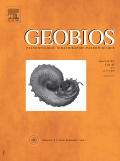
GEOBIOS
Pioneering Research for a Deeper Geological UnderstandingGEOBIOS is a prominent academic journal published by Elsevier France-Editions Scientifiques Medicales Elsevier, specializing in the fields of Paleontology, Space and Planetary Science, and Stratigraphy. With a rich publication history dating back to 1966, the journal aims to foster scholarly communication and dissemination of significant research findings among professionals and researchers in earth sciences. Recognized for its impact within the scientific community, GEOBIOS holds a respectable Q2 ranking in several categories, positioning it within the top tiers of scientific journals. Despite its traditional publication format, the journal provides a platform for groundbreaking studies that influence our understanding of both the geological past and future planetary developments. The journal's consistent ranking, including Rank #36 in Paleontology and Rank #59 in Space and Planetary Science, underscores its relevance and significance in its field. GEOBIOS serves as an essential resource for those engaged in the exploration of earth's history and its extraterrestrial counterparts, making it invaluable to researchers, students, and professionals alike.